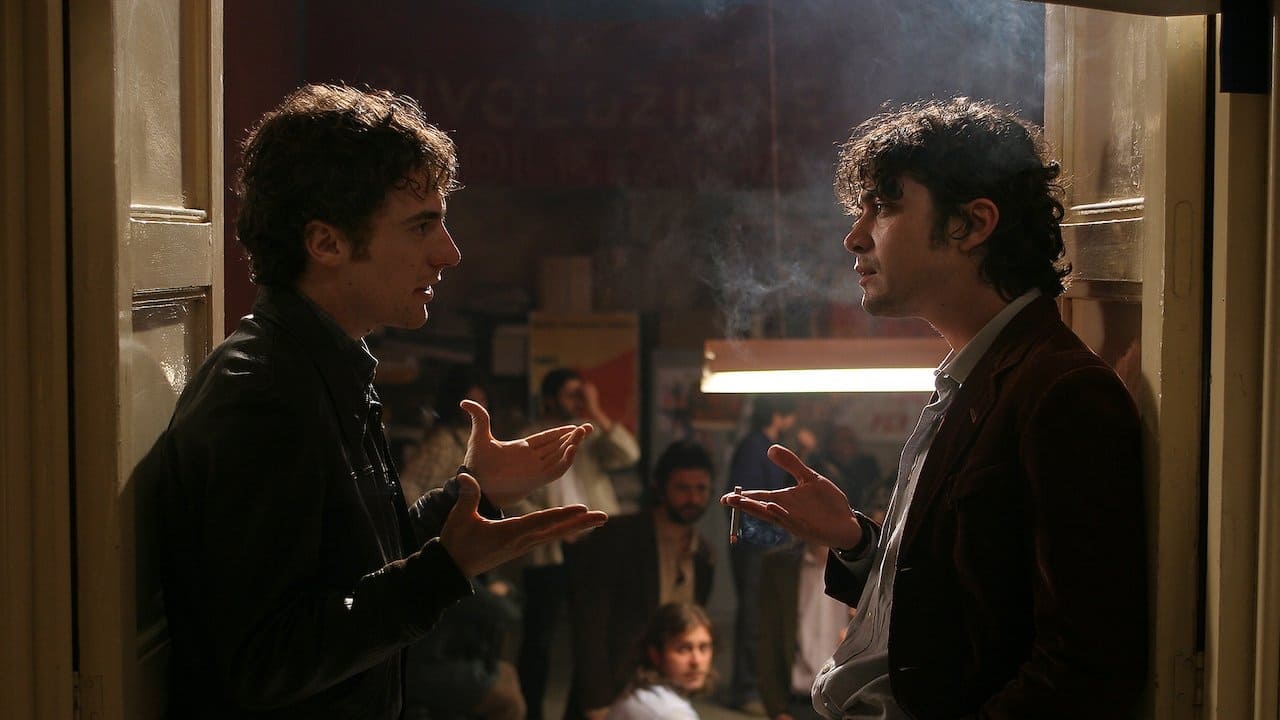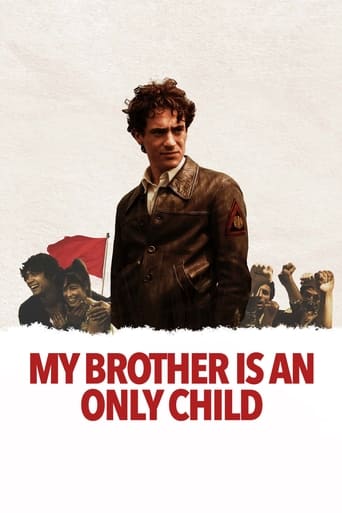



Very well executed
Purely Joyful Movie!
Fanciful, disturbing, and wildly original, it announces the arrival of a fresh, bold voice in American cinema.
View MoreI think this is a new genre that they're all sort of working their way through it and haven't got all the kinks worked out yet but it's a genre that works for me.
View MoreOur little film here is a coming of age tale of one young man's developing maturity from youth as a deluded fascist to a more left-ish political slant. The film title refers to an old Italian song, and in the context of the film refers to his older brother who is a strong willed communist activist (although there is a sister also who like the family as a whole is quite left-ish).The film is really a feel good movie and it's humour all the way. The brothers may bicker but there is love between them despite any conflicts. Add in a mild love triangle with the elder brother's lady, and you have a real hodge podge reflecting the complications of youth for our lead man.As much as you'll enjoy the film for its humour, there is still something missing. The story with its material could have said so much more. There are lots of good characters but you never feel it builds up to enough. The film never seems to challenge any of the views on screen. Feels like an opportunity lost somehow.Beautifully filmed with great acting, you will enjoy the film. Great acting from the ensemble adds to the experience, but I just wish that we'd been given more in the story that was served up. However I still enjoyed it.
View MoreThere's this much to be said for this movie from the ranks of Italy's new young directors and actors: The quality of the acting was at least one notch above the usual fare, which almost never transcends the clichéd facial expressions and intonations we expect to find in TV dramas and sit-coms. This new generation of actors and directors was raised on US television imports ("telefilms") and Latin-American soaps, and it definitely shows in the uninspired and uninspiring quality of their work. And one gets the impression that 90% of them come from Parioli, a very well-to-do neighborhood of Rome, that would be the rough equivalent of coming from Santa Monica, Lake Forest IL, or Westport Conn—all those perfectly groomed faces coming from families of the Italian haute bourgeoisie with unlimited funds to advance their children's "acting career." If it weren't for Elio Germano as Accio (as well as Luca Zingaretti as Accio's fascist mentor and Anna Bonaiuto as his wife), this movie would probably fall into the same category of banalized film-making with all the rest. But Germano's performance is not enough to salvage a film that fails to rise above a rating of "mediocrity +". Certainly it was an interesting idea to situate the action in Latina, a city built from scratch by Mussolini's fascist regime after it had drained the surrounding swamp land (the "bonifica" that was one of Fascism's highly touted achievements). All of the city's architecture was inspired by fascist "monumental" design.Regrettably, Luchetti has done little of interest to exploit this setting for his family drama other than to bring up the same old cliché of opposing extremisms (the thuggery of the neo-fascist right vs. the banditry and targeted terrorism of the extra-parliamentary left). And the drama of the conflict between these two extremisms is used altogether too much to drive the plot forward. Some Italian commentators disliked this film because it seemed to go over the same old ground in the same old way—when it was time, presumably, to move on to new subjects. But the problem was not that it rehashed Italian history—the problem was the "hash." Bellocchio, after all, did a wonderful job of re-interpreting to Italians the experience of the Red Brigades in his "Buongiorno,Notte". But here the audience is simply given a choice between fascist hooliganism and a lunatic left, when actually the situation in Italy in the 60s and 70s was much more complicated and nuanced. Millions of Italians belonged to parties and movements that were seriously committed to a progressive transformation of Italy that did not involve knee-cappings and assassinations. And so Luchetti ends up confirming (perhaps despite himself) the American/Berlusconiano vision of the world: "Forget about ideology—it's all about individual freedom and authenticity in your personal relationships." And finally we can see the effects of Berlusconi's TV stations and their ilk also in the movie's script. After 20, I stopped counting how many times the characters said, "Ma Che Cazzo Dici?"("What the f#%k are you saying?"). It is a measure of the moronization of the Italian public under the sway of Berlusconi and Berlusconian media that the scriptwriters think that they can get a laugh out of an Italian audience with this phrase each and every time it is said—and sadly they're probably right.
View MoreThe political backdrop of this 60s character drama is both nostalgic and frightening - that disaffected and rebellious Accio finds himself so easily taken in by a Fascist mentor strikes parallels with the our own young men turning to extremism or street violence in a search of identity. Accio clashes dramatically with his older brother, the hip, good-looking communist, but the story not so much about political ideals as their expression of familial jealousies and personal moral development.The tensions and affections of this struggling working class family, portrayed by all with genuine emotion. The dialogue is witty and charming and not unlike other memorable Italian films (Il Postino, Cinema Paradiso) the characters come across almost too resoundingly. This gives the film a well-crafted theatrical quality, that is engaging, well-paced and very satisfying.
View MoreSimply put, a very good movie. As somebody who lived through part of those years, I really appreciated the way it managed to recreate their social and political 'atmosphere'. Yes, it is not the first flick to deal with those topics, but hey, how many movies about WW2 have we seen so far? Was Flags of our Fathers less good for this reason? I particularly liked Accio's description of personal relationships between the brothers, as well as the intriguing political evolution. I thinks that Scamarcio's presence could also take a younger audience to this movie, something which would be very good as some stories are just worth remembering (I can't stand the "let's forget about it and move on towards modernity" approach; awfully dangerous for a civilized society). Back to the cinema factor, all actors fit well in their roles, although the Accio's sister was kind of lame at times. Zingaretti's performance as a hardcore fascist, on the other hand, was made even more intriguing by his close association with the ever-different character of Commissario Montalbano in the popular TV transpositions of Camilleri's novels (which by the way I strongly recommend to anyone interested in Italian written fiction).
View More